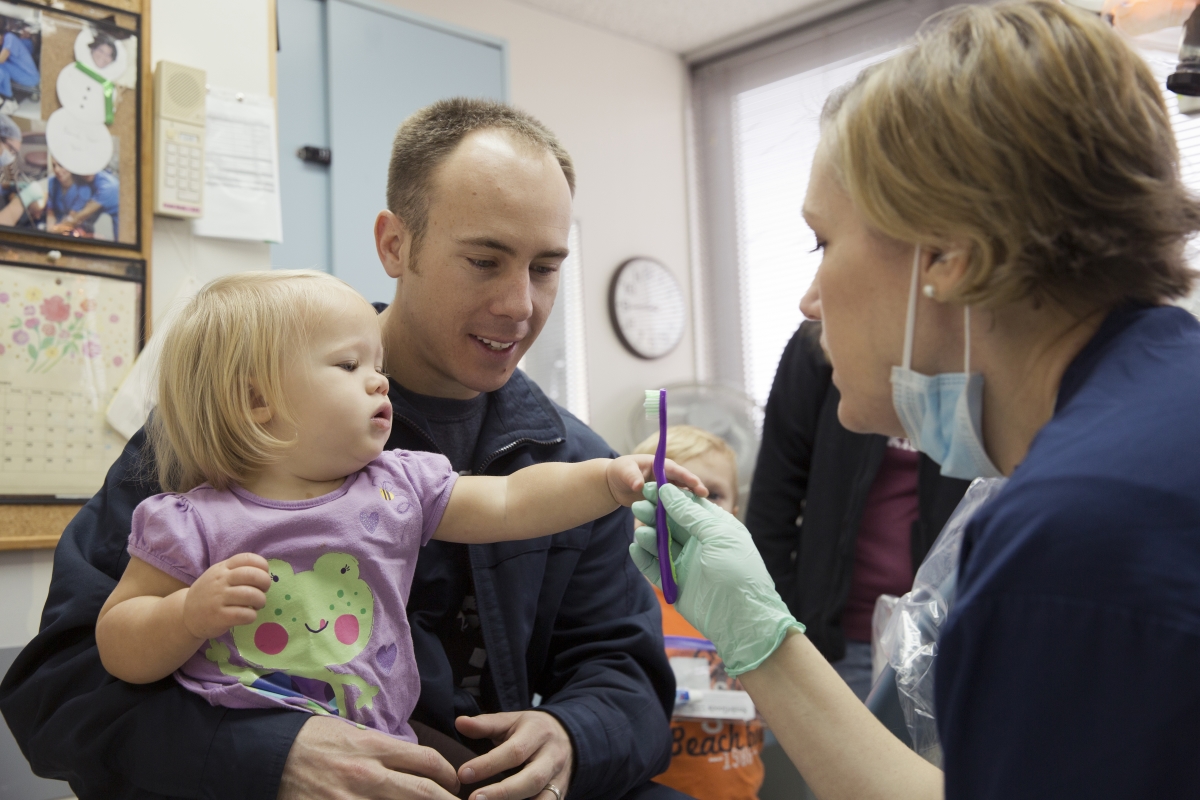Health insurance is an obvious concern for most expectant mothers, and it comes up naturally in the course of needing prenatal care and an obstetrician. Few parents, however, think about when to add a kid to dental insurance.
Is it important to have dental insurance for kids? Babies aren’t born with teeth, after all, and it will be about six months before any start to appear. But dental health is an essential part of a child’s overall wellbeing. And while there’s no precise rule about when to add them to a dental insurance policy, it’s best to consider the question before they’re ready for their first visit to the dentist.
The Importance of Infant Oral Care

Many parents think that since primary teeth (also called baby teeth) eventually fall out, they can postpone thinking about dental care for their kids—at least until they have adult teeth. But tooth decay can grow in primary teeth, just like in permanent teeth, and lead to cavities. Cavities can be painful and may interfere with a child’s ability to chew and talk. And they are much more common in young children than many people realize. According to the Centers for Disease Control, one in five children between the ages of 5 and 11 have at least one untreated cavity.
The best time to take a child to their first dental appointment is by their first birthday, or within six months of the appearance of their first tooth, whichever comes first. The dentist will do much more than just look for cavities. They also monitor the growth of the mouth and jaw, checking on gum health and bite alignment. All of these can impact the child’s development as they learn to talk and chew solid food.
In addition to regular dentist visits starting with those first teeth, kids can sometimes end up needing emergency dental care. As toddlers become mobile and explore the world, accidents can happen. Chipping or knocking out a baby tooth is something that needs immediate attention. A break can allow bacteria into the tooth’s root and cause a cavity. Losing a tooth before it’s ready to fall out could affect how the permanent teeth grow. Both can result in future dental problems if not fixed.
Dental Insurance vs. Out-of-Pocket Costs
Even if parents understand the importance of taking their young child to the dentist, they may still wonder when to add them to their dental insurance, or if it’s even necessary. The answer to both questions is different for everyone. Parents must look at the nature of their dental plan and the costs of the insurance premiums compared to what a dentist will charge.
Type of Dental Insurance Plan
Parents can sometimes get dental insurance through their employer’s insurance plan. If they are not covered, or if dental is not an available option, they can purchase coverage on their own. There are three basic ways to get dental insurance for kids.
Embedded plans include dental coverage along with all other health benefits at no extra cost.
Bundled plans offer different types of insurance—dental, vision—sold separately by the same carrier as add-ons to the basic health insurance policy. People get to choose with options to add to their bundle.
Stand-alone plans are purchased by themselves, separate from a health plan. They may be available through a medical carrier, or from a stand-alone dental insurance carrier.
These three types of plans may differ in the premium price, deductibles, what services are covered, and even which dentists can be seen.
Comparing Costs and Other Factors
For most parents, the deciding factor of when to add a kid to dental insurance will be the premium cost as it compares to potential out-of-pocket costs for the child. Dental insurance premiums are usually reasonable—roughly between $15 and $50 a month for an individual. Family plans are usually not quite double that cost, no matter how many family members. If there is a family policy in place, it shouldn’t cost anything extra to add the new baby.
For small children who still have their baby teeth, out-of-pocket costs might not amount to much. A standard checkup, for example, might cost about $50 or $60. Assuming two dental visits a year, if premiums exceed $100 to $120 per year, it is cheaper to simply pay the dentist directly.
This is especially true when the child is still an infant. As they get more teeth, and then their permanent teeth, their dental costs can start to add up. The cost of checkups, fillings, dental sealants, and braces if they’re needed can quickly go over what an insurance premium would cost. (Assuming, of course, that the policy will cover sealants or orthodontia.) Ask the dental practice for the estimated cost of various treatments to see how a typical year of expenses will compare to an insurance premium. A big difference in dollar amounts will make the decision to add your child to dental insurance, or not, an easy one.
Parents should also read policy details carefully to know what services are and are not covered. It’s possible to owe out-of-pocket costs on top of an expensive insurance premium.
It is important to check whether their chosen dentist accepts their insurance plan. Many parents of young children opt for a pediatric dentist who specializes in the treatment of small children. If that dentist isn’t part of your plan, you may need to rule him or her out.
Timing Enrollment
How old a baby is relative to enrollment timeframes for a dental insurance policy may determine whether to add the child or wait a year. Let’s say a plan covers the period from January 1 through December 31. A baby born in the fall would not need coverage for the current year. They might even be able to skip coverage for the following year if they have a birthday late in the year. Even if they are ready for their first dentist visit in November or December, the cost of the visit will probably be less than insurance premiums for the whole year.
Once the child has passed their first birthday, parents may want to revisit the issue. As regular dental visits and potential problems are more common, dental insurance might make more sense.
Choosing Baby’s Dentist

If you need to find a dentist for your child, we have an online tool that makes it easy. Several factors should go into choosing one who is right for your child.
Most importantly, your child should feel comfortable, whether you choose a pediatric dentist or a family dentist with experience treating kids. Dental visits can be a positive experience, without anxiety or fear.
Next, ask your dentist about costs and insurance. This will help you know when to add a child to your dental insurance, or whether it is more cost-effective to pay out-of-pocket.
Starting children out early with dental visits is the smart thing to do. Good oral health is important to a child’s overall wellbeing and self-esteem. Insurance coverage is one way to help make it happen.


